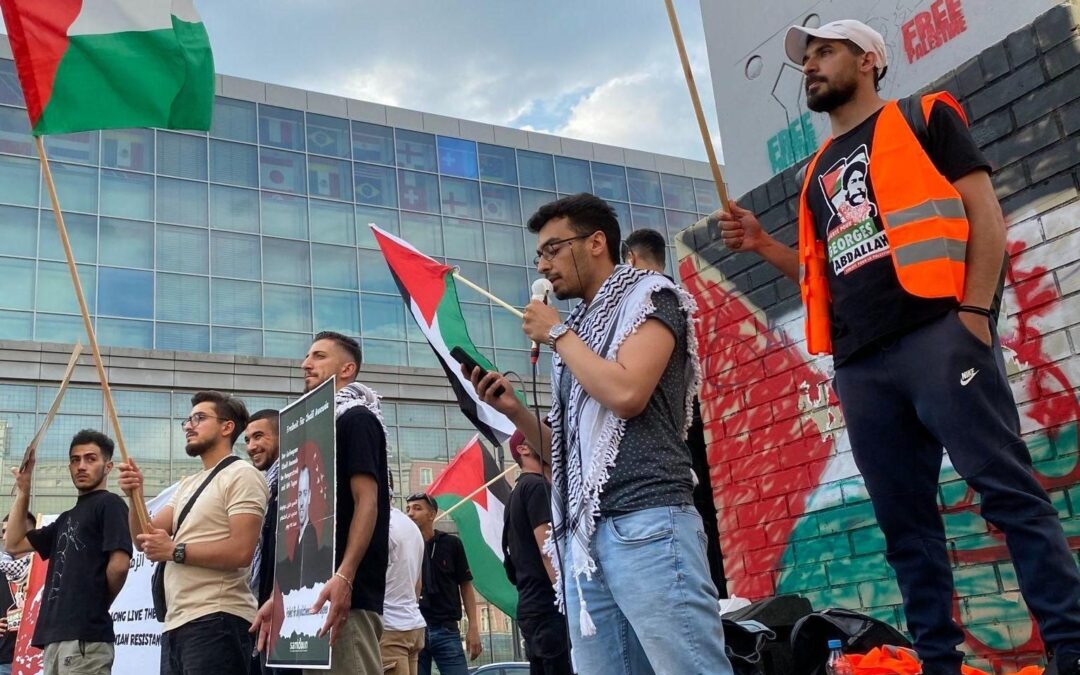- The essence of the Masar Badil mmovement’s project is restoring the role of the diaspora in the struggle in all its forms
- It is not possible to build “national unity” with the agents of the occupation, and it is not permissible to grant them legitimacy.
- Our movement values the role of the Islamic resistance forces and their defense of the dignity and rights of our people
- The resistance factions derive their legitimacy from their acts and practice of liberation and not through their relationship with the “Palestine Liberation Organization”
- Our people’s struggle continues until the achievement of return and liberation
Comprehensive Interview with Zaid Abdulnasser
As the Palestinian people continue their ongoing struggle against the Zionist entity, its colonialism, and settler attacks, from the river to the sea in occupied Palestine, the flames of Palestinian resistance are intensifying. This has become particularly prominent in the villages, cities and refugee camps of the West Bank and Jerusalem.
The responsibilities of our Palestinian people in exile and diaspora are also increasing as the confrontations with the Zionist enemy escalate. The Masar Badil, the Palestinian Alternative Revolutionary Path Movement, is preparing to hold its conference and commemorate its second anniversary from October 19-22, 2023, in France, including participating in the mass march to free Georges Abdallah and all Palestinian prisoners in Lannemezan on October 21.
This comes at a time when repression and racist policies against Palestinians and supporters of resistance and Palestinian rights are on the rise in many countries, especially in Europe. This interview explores the current political situation and the resistance to repression with Zaid Abdulnasser, a member of the Executive Committee of the Palestinian Alternative Revolutionary Path Movement and the coordinator of the Samidoun Palestinian Prisoner Solidarity Network in Germany.
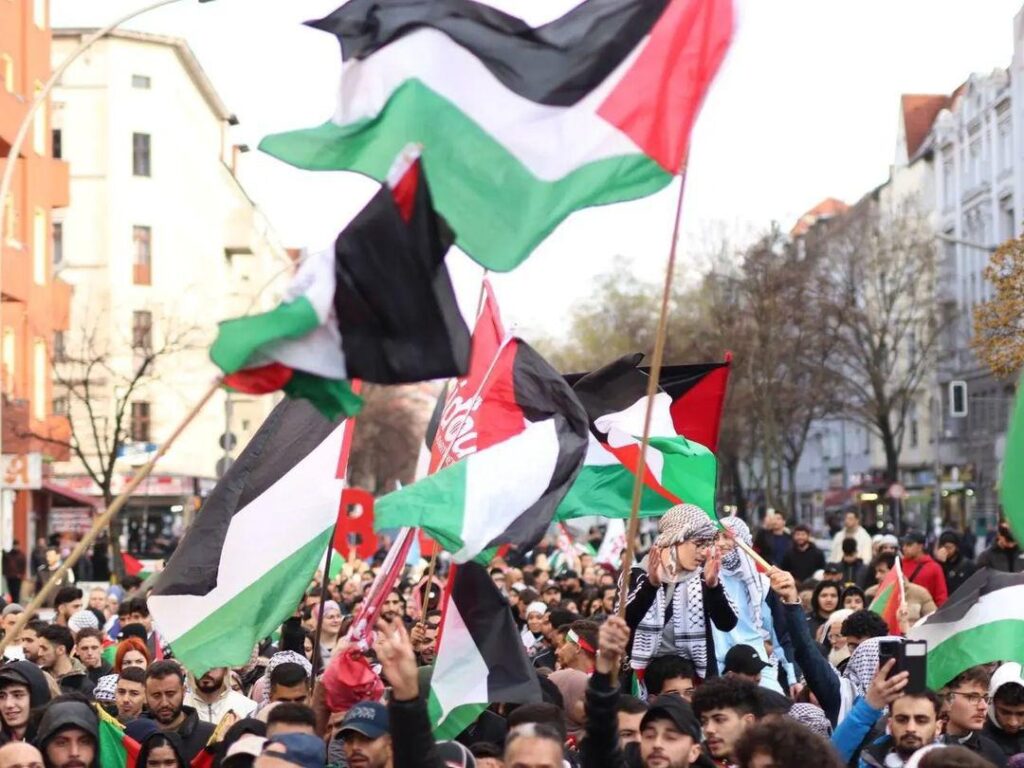
It has been approximately two years since the founding of the Masar Badil, the Palestinian Alternative Revolutionary Path Movement. Now, you are preparing to hold the movement’s conference in Toulouse, France. What is your assessment of the movement’s role during this time?
Answer:
Over the past two years, our movement has grown and evolved significantly in Europe and North America, and recently, we have started to engage with some areas in Latin America. The movement has become more recognized within the solidarity movement in the West as well as in the main currents of Palestinian politics. Especially after the Oslo Accords, the discourse around Palestine has been dominated by the so-called “two-state solution” or portraying the Palestinian cause as a primarily humanitarian issue, especially in the imperialist states of the West.
On the other hand, our movement seeks to highlight and uphold the clear national and historical rights of the Palestinian people, as well as our key principles (thawabet) outlined in the Palestinian National Charter of 1968 before it was illegitimately altered by the monopolistic leadership clique in control of the Palestine Liberation Organization. Through its grassroots work, the movement aims to reestablish the goal of liberating Palestine from the river to the sea, express unconditional support for Palestinian resistance, and protect the right of return. Therefore, it takes a clear stance against the Oslo liquidation approach and the security coordination “Palestinian Authority” in Ramallah.
The main factor that allows a movement like ours, which has not even completed its second year, to play this growing political role is the state of betrayal and absence in the diaspora as a direct result of the PLO leadership’s actions after its participation in the 1991 Madrid Conference and the disastrous signing of the Oslo Agreement in 1993. These actions represented a complete abandonment of our people’s rights, especially in the Palestinian diaspora. It undermined our people’s struggles, excluded them, usurped their natural role, and stripped them of all their organizational frameworks and tools of struggle.
The Alternative Revolutionary Path Movement seeks to provide new arenas for our people to engage in genuine struggle based on their aspirations and principles. This has allowed our movement to progress rapidly and build relationships with many liberation movements and forces that were looking for a Palestinian voice in the diaspora that is seriously committed to the struggle liberation and return. This role will not be carried out by the embassies of the Authority or NGOs.
We are aware that the road ahead is long and challenging, requiring us to strengthen ourselves organizationally and build our popular base, expand the scope of our work and its impact, and improve our ability to reach Palestinian and Arab communities and provide spaces for struggle. We seek to harness the immense, latent capacities of our people for the project of liberation and return. In short, the Palestinian Alternative Revolutionary Path Movement, with its growing revolutionary project, continues until the liberation of Palestine from the river to the sea. Our movement seeks to be a revolutionary tool in the hands of our people to enable them to participate in and exercise their natural role in the liberation struggle.
What are the main challenges you face, especially in Germany, and Europe as a whole? And how can the level of confrontation against the Zionist movement be raised in Europe?
Answer:
We are an integral part of the Palestinian people. It is only natural for us to be targeted by the Zionist occupation entity, both in Palestine and around the world, through various means. Samidoun Palestinian Prisoner Solidarity Network was classified as a terrorist organization in February 2021 by the Israeli Minister of War, Benny Gantz. In France, Emmanuel Macron announced his intention to dissolve the Collectif Palestina Vaincra, which is one of the main organizations that participated in launching the Alternative Revolutionary Path Movement.
In Spain, our comrades face trials for confronting the Zionist movement, particularly the Zionist ambassador in Madrid. Similar situations exist in the Netherlands, Switzerland, Belgium, Canada, the United States, and other countries. We consistently face calls for criminalization, bans on our activities and events, and media demonization campaigns targeting the movement, its organizations, its cadres, and its supporters.
In Germany, there is a high level of coordination between Zionist movement organizations, the Israeli embassy, the German media, and various state agencies. They have successfully managed to ban Nakba commemoration demonstrations in 2022 and 2023, as well as demonstrations commemorating Palestinian Prisoners’ Day in 2023. Recently, they escalated their measures, started restricting our cadres, and revoked their residencies under the pretext of their membership in the Palestinian Alternative Revolutionary Path Movement. It’s worth noting that Berlin has become the capital of the Palestinian diaspora in Europe, especially after the wave of refugees resulting from the war in Syria. This explains the state of alertness among the state and Zionist institutions and their fear of the involvement of these segments of our people in the struggle.
Samidoun has managed in Germany to bring forward the program of the Alternative Revolutionary Path Movement, and to organize at a popular level in the Arab community. Samidoun in Germany has organized rallies with the participation of thousands of our people and supporters of our cause, raising their voices for the liberation of Palestine from the river to the sea, and expressing full support for Palestinian resistance. Therefore, the targeting of us and our work is a systematic attack on this engagement of the popular masses in the cause and a fear of its potential for growth and formation as a true mass force in Germany, which is the stronghold of the Zionist movement in Europe.
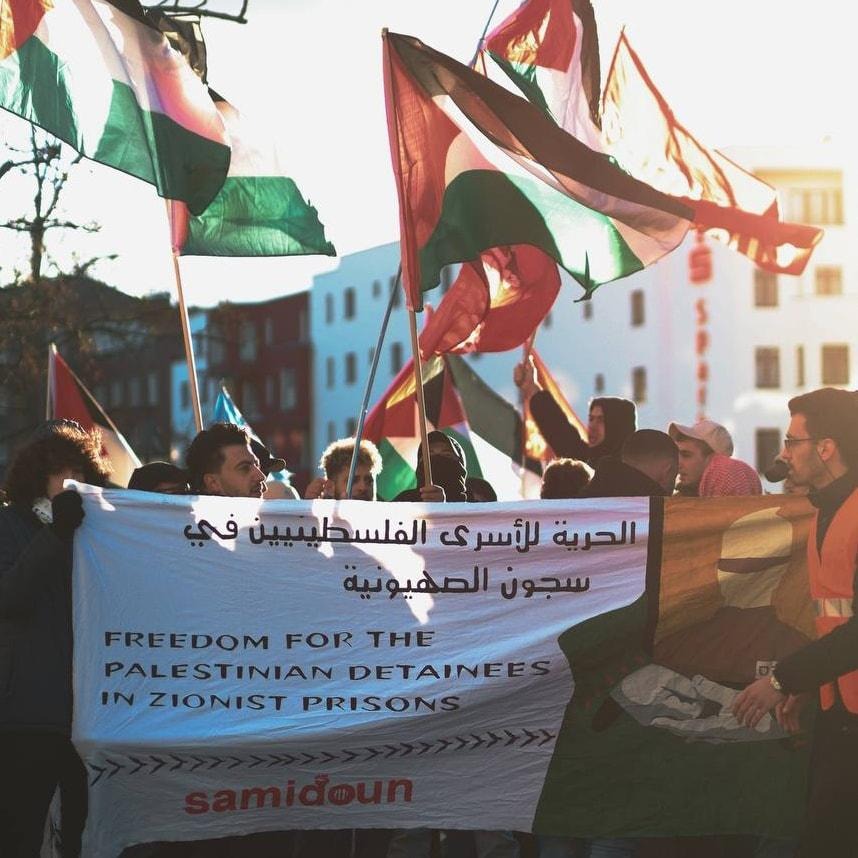
Why is this Zionist attack specifically targeting you?
Answer:
The attack on the movement, its organizations, and its cadres indicates that the enemies of the Palestinian people feel threatened by the Alternative Revolutionary Path Movement and its impact on their interests. The movement is evolving and growing rapidly, posing a threat to the Zionist movement and its interests in these countries. These forces understand that if the Palestinian diaspora regains its role, it can influence the course of the battle with the enemy and its supporters. This fact, recognized by the ambassadors of the Zionist entity, is also acknowledged by the forces of Palestinian resistance. In our view, this is an achievement for the movement.
As for raising the level of confrontation with the Zionists, the Zionist movement consistently seeks to suppress any Palestinian action, across all fronts and in various forms, from liberal expressions to popular revolutionary mobilization. There is no action defending the rights of the Palestinian people in the West that does not face some form of backlash or repression. However, the degree of hostility escalates in parallel with the elevation of discourse and the seriousness of the project. Consequently, our commitment to our positions and the continued building of our revolutionary and radical project naturally leads to an increase in the level of confrontation with the Zionist forces. This confrontation is likely to escalate as the movement evolves and expands its capabilities.
At present, we are still in the defensive stage. We receive attacks and respond by firmly adhering to our positions, continuing our work and leveraging this targeting against us to build strategic alliances with local revolutionary and progressive forces, as we have seen in France, Germany, Spain, and Canada. In the long term, once we reach the stage of popular mobilization, we will be able to confront the Zionist movement both popularly and politically, marginalizing it from the public sphere. The Zionist enemy does not just exist inside occupied Palestine; its arms extend to these countries. Undermining these arms is a real blow to the enemy in Palestine and to the Zionist movement.
The Alternative Revolutionary Path Movement adopts a negative stance towards proposed elections in the West Bank and Gaza Strip, as well as the efforts made by the Authority and Palestinian factions that are characterized as promoting reconciliation and national unity. In the face of the fragmentation and confusion experienced by the national movement (referred to by some as “the division”), what is your vision for achieving national unity in the Palestinian arena?
Answer:
We in the Alternative Path Movement express the popular Palestinian and Arab stance, which sees “security coordination” with the occupation, the arrest of members of the resistance, the desecration of martyrs’ funerals, and attempts to end the struggle in the West Bank, as well as participation in the siege on Gaza and the abandonment of Palestinian refugees, as crimes and acts of national betrayal that exclude the Authority from the national sphere.
National unity cannot be built with the tools and agents of the occupation, nor should they be legitimized. We believe that true legitimacy is embodied in the positions of our people and their sacrifices, which are naturally expressed daily, and through embracing the line of resistance everywhere. It’s important to emphasize that the legitimacy of the resistance factions is derived from their acts of liberation and resistance themselves, not through their relationship with the Palestine Liberation Organization, through participating in fake elections under the occupation’s control or by entering the structures of the Palestinian Authority and the remnants of the Oslo Accords. These elections under occupation distort the popular will and do not represent the Palestinian people in the refugee camps, the diaspora, or in occupied Palestine in 1948. We would like to emphasize the importance of the Islamic Jihad Movement’s principled stance of rejecting participation in Oslo elections, which enhances our people’s trust in its revolutionary line and protects the movement from slipping into a conciliatory position.
We believe that true national unity is the unity of our entire people, the resistance factions, and the popular organizations around the project of liberation and return. From its inception, the Alternative Revolutionary Path Movement has called upon all resistance forces to build a broad national front that represents the hopes and aspirations of the Palestinian people and derives its legitimacy directly from them, just as the early Fedayeen (Palestinian resistance fighters) derived their legitimacy through their struggles, sacrifices, and defense of their people. This popular national unity and unity on the fields of struggle will be a solid unity that leaves no room for wavering positions or gray areas. True national unity does not allow one party to dominate the fighters of another party in the interests of serving the occupation. This vision is the only way out of the dismal situation created by the “official Palestinian leadership,” and it will reinvigorate hope in the hearts of our people. We believe that this form of national unity represents a true essence that brings together the resistance forces and the popular organizations with their experiences, histories of struggle, popular reach, and institutions capable of arousing and revitalizing the deteriorating Palestinian situation and creating more spaces through which our people in Palestine and the diaspora can actively participate in the struggle for the liberation of Palestine.
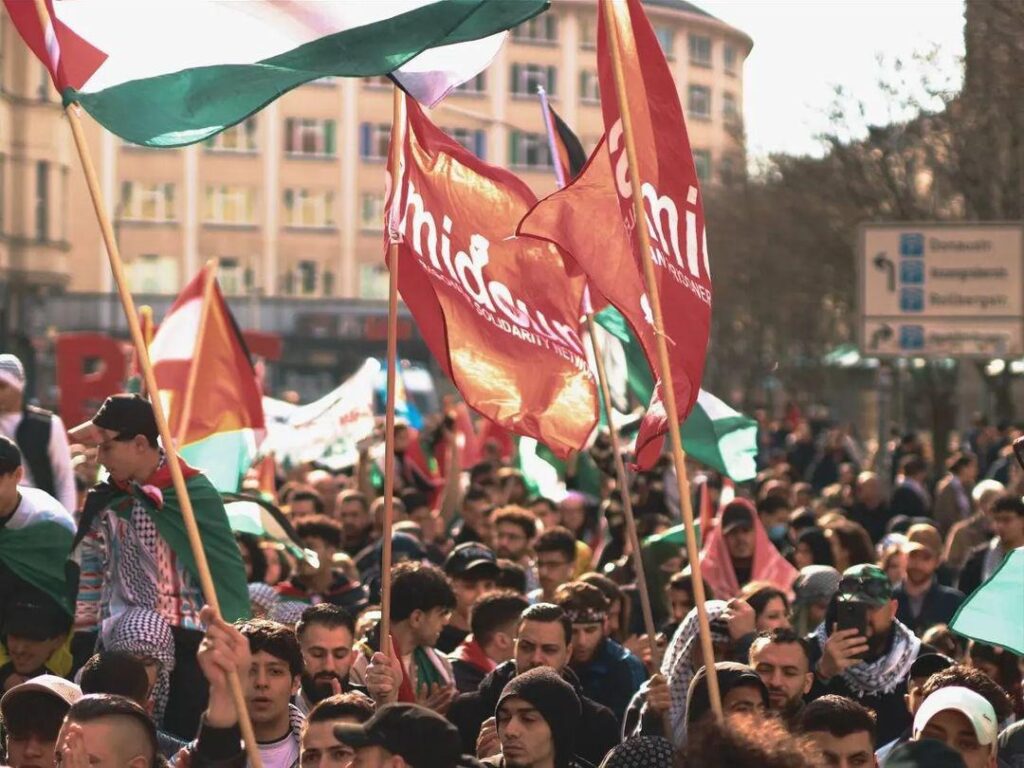
Some see the role of the Alternative Revolutionary Path Movement as limited to certain areas in the diaspora, and your grassroots and political activities are still under the umbrella of “solidarity work.” Do you agree with this assessment?
Answer:
This assessment is correct in its first part. The movement has been able to reach some areas in the diaspora, specifically in North America and Europe, and the movement primarily exercises a political role in these countries. However, our work differs drastically from the concept of “solidarity work” because we do not engage with the Palestinian cause from the perspective of merely being “in solidarity” with Palestine. It is not enough for us to just be a support for our people in historical Palestine; rather, we are an integral part of the Palestinian people and their liberation movement. We must play a genuine and active role in the struggle to liberate ourselves from the constraints of refugee status and participate in the liberation of our land from the Zionist enemy.
This is the essence of the project of the Alternative Revolutionary Path Movement: reclaiming the diaspora’s role in the struggle in all its forms. This includes solidifying our political stances, spreading revolutionary awareness, building trust with the masses of our people in the diaspora, establishing institutions and organizational tools that allow them to exercise their rights and duties and their natural and pioneering role in the struggle, investing their energies in the path of liberation and return, confronting the Zionist movement, and joining forces with our people’s glorious and steadfast resistance. Only through this work will the Palestinian struggle witness a qualitative leap in the diaspora that brings our people closer to the date of liberation and return.
Since our launch in October 2021, despite our very limited resources, we have made progress in raising the bar of our political stance, strengthening the institutions involved in the movement, and raising the level of confrontation with the Zionist project. However, this doesn’t negate the fact that we are still in the stage of birth, the stage of mobilization, organizational development, and internal construction. This is an invitation to all of our people in exile and diaspora to participate in building this movement and to reclaim their role in the struggle for the liberation of themselves and their homeland, Palestine.
In just weeks, we will mark 30 years since the signing of the Oslo Accords and 29 years since the establishment of the Palestinian Authority in the West Bank and Gaza Strip. How do you view the role of Palestinian youth in exile and in the diaspora? Can the constraints and consequences of Oslo be overcome? How?
Answer:
I reiterate here what I have said before. The Palestinian diaspora was completely marginalized in the Palestinian political scene after the Oslo agreements, and its role was seized after being central to the Palestinian revolution. This catastrophic situation made our people in the diaspora feel powerless and frustrated in the face of ongoing aggression against our land and our people. This feeling intensified after they lost their mechanisms and arenas through which they could exercise their natural role in the liberation struggle. This situation over the past three decades has led to the spread of an individualist mentality, aligning with the policies of some Western countries, and the emergence of what some refer to as the “struggle of identity,” especially for those Palestinians born in these countries.
The solution to these dilemmas and challenges is the same solution proposed by our National Charter in 1968: Palestinians exercise their national identity through the struggle for their just cause and the rights of their people.
In this time, and after the catastrophe of Oslo and the experiences of betrayal, it is imperative to organize the diaspora based on a struggle that reflects its hopes and aspirations, regain its readiness for sacrifice, and be prepared to relinquish certain privileges for our greater goals, to meet the sacrifices our people in Palestine make every day for our cause and our dignity.
The popular institutions built by our people in the diaspora with blood and sacrifice throughout the early decades of the Palestinian Revolution have been deliberately destroyed. However, our people is capable of rebuilding them and reinstating their central role in the national liberation movement, as they have done over the past decades, renewing themselves after each setback, returning stronger and more resilient.
As for our role in the Alternative Path Movement, we believe that the first step is to cultivate revolutionary awareness wherever we are present. This involves solidifying political stances that, in particular, Western imperialist countries may deem “unacceptable,” and maintaining them regardless of the level of oppression that we face. This confrontation with the Zionist movement solidifies our movement and positions in the streets and expands our presence in the diaspora. This situation can be built upon, and through cumulative struggle and work, we can achieve a massive popular mobilization, capable of shouldering its historical responsibilities.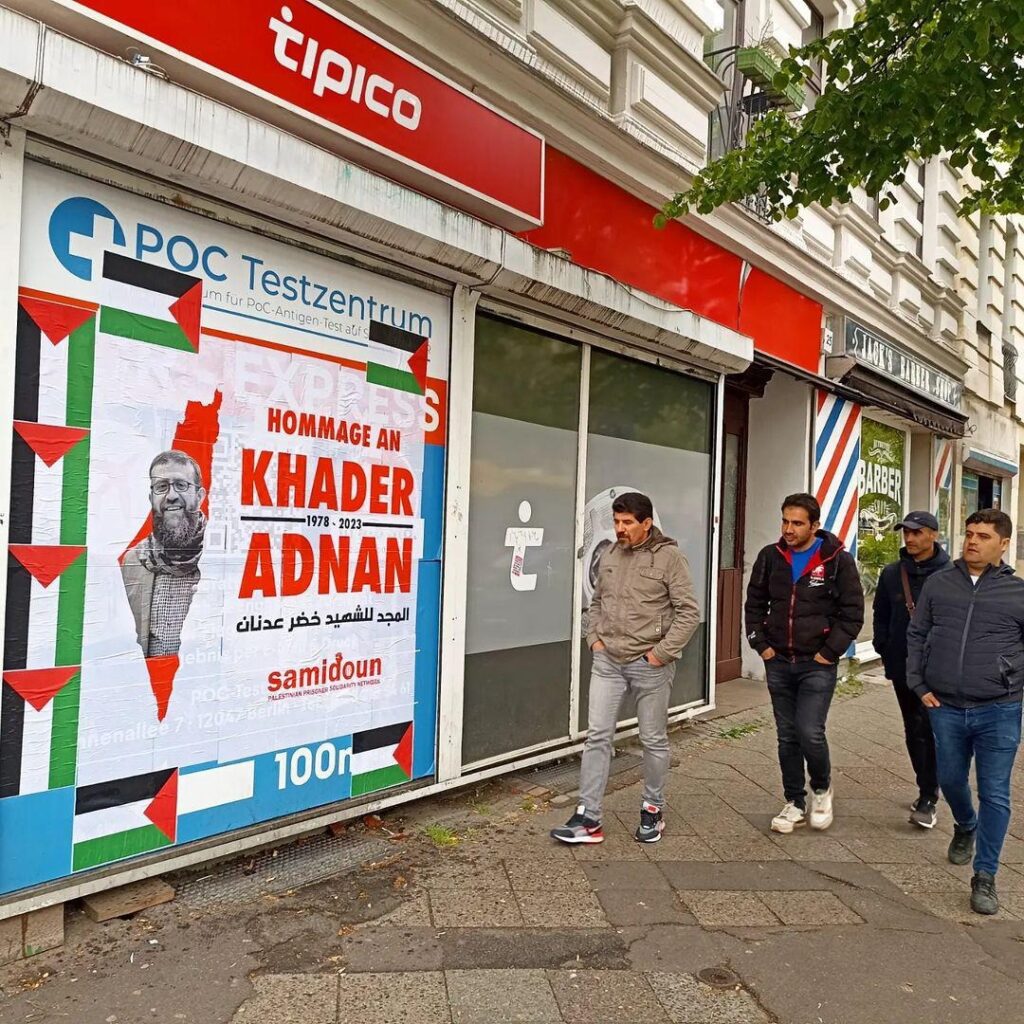
You have called on your supporters to participate in the annual popular march in front of the French prison in Lannemezan on October 21, 2023 for the liberation of the Lebanese Arab struggler for Palestine, Georges Abdallah. Some people see that such popular and solidarity actions have failed to exert sufficient pressure on the French government to release Abdallah. He has been imprisoned since 1984, and more than 40 years have passed since his imprisonment. Do you have a different approach or strategy for exerting greater pressure on France to secure his release?
Answer:
These popular demonstrations are part of an integrated campaign that has been ongoing for over 15 years. Georges Abdallah, the struggler, has himself actively contributed in building the campaign through his steadfastness and endurance, as well as his dialogues with our comrades who have consistently visited him in captivity.
This continuous campaign takes on various forms, from rallies, stands, and seminars, to raising awareness about the Palestinian issue and Georges Abdallah’s case. It also includes producing and screening the film “Fedayeen” (which has been shown around 200 times in over 25 countries), coordinating with the National Campaign to Free Georges Abdallah in Lebanon, and the significant role played by Georges’ family in the struggle.
These forces and activities have succeeded in creating a popular momentum that prompted the Lebanese Ambassador in France and leaders of French leftist parties to visit him in prison. It also led to debate in the parliament between supporters and opponents of his release, with a growing number on the left demanding his freedom. This is also one of the most important international campaigns to raise awareness about the issue of Palestinian prisoners, especially outside Palestine, and their struggle. Dozens of organizations throughout France now demand his release and his case is on the agendas of various leftist organizations in Europe, especially in France. This popular work has the potential, over time, to push for his release when the cost of keeping Georges in captivity becomes higher for the French state than the cost of releasing him.
We in Samidoun Palestinian Prisoner Solidarity Network acknowledge that the most direct, secure, and expedient way to liberate prisoners is through armed resistance, as we have repeatedly seen in the exchange operations that have taken place over the past decades, where Palestinian and Lebanese resistance succeeded in forcibly imposing their will on the enemy. The primary role of popular action, however, is to spread awareness about the prisoners’ issue, highlight its centrality, and create an environment where people feel connected to the struggles of our prisoners and their liberation. Defending our prisoners is defending the cause for which they have and continue to struggle every day and every hour—a struggle we are proud of.
The main resistance movements in Lebanon, Palestine, and the Arab region represent Islamic forces with broad popular presence, such as Hamas and the Palestinian Islamic Jihad movement, among others. Meanwhile, there is a noticeable decline, even to the point of absence, of leftist, nationalist, and liberal forces. How do you categorize your movement ideologically and politically? How do you view resistance forces with religious references?
Answer:
The Palestinian people’s connection to resistance is an organic bond we have experienced throughout history. When the Popular Front and the Fatah movement led armed resistance as major organizations, a nationalist and leftist character prevailed in the Palestinian national movement and resonated in the sentiments of our people everywhere. Before that, during the era of Jamal Abdel-Nasser in Egypt, the struggle took on an Arab national character, and slogans of “unity, socialism, and freedom” dominated. Today, Islamic movements like Islamic Jihad and Hamas lead the resistance in the West Bank and Gaza against the Zionist enemy. It is natural for them to be at the forefront and in the hearts of the Arab and Islamic nation.
The Alternative Revolutionary Path Movement is aware since its inception of the central role of these steadfast and struggling movements and deeply respects the sacrifices they have made and are mkaing to protect the rights and cause of our people, and to create an unbreakable popular support for the resistance in the most difficult places for Palestinian organization in the world – historic Palestine – under the Zionist occupation and facing the PA as a security tool in the hands of the enemy. Our movement also values the vanguard role of the Islamic resistance in confronting the Zionist enemy’s attacks on our people and holy sites, defending the dignity and rights of our people wherever they are, and continuing the national liberation struggle which has never ceased, from the British occupation of our land until today.
In our movement, we see that our role as complementary to the resistance in Palestine. Our role is to provide popular support for the resistance, carry its voice forward in the diaspora, and empower the masses of our people in exile and diaspora to build their tools of struggle, enabling them to participate in the liberation movement and defeat the Zionist enemy outside Palestine as well. The relationship between the various components of our people in the homeland and the diaspora is a complementary relationship in the face of our primary contradiction against the occupation and the Zionist movement.
Ideologically, since its inception, the Alternative Path Movement has adopted a set of general principles of struggle as outlined in the Palestinian National Charter of 1968, which reflects the aspirations of the Palestinian people in all their orientations. Simultaneously, most of our movement’s cadres come from leftist experiences, and our organizations are progressive, informed by the analysis and legacy of the Palestinian and Arab revolutionary left. As a result, the movement has naturally taken on a revolutionary leftist character in its analysis, language, and overall approach. This direction has allowed us to reach most of the solidarity forces with Palestine in the West, which are predominantly leftist forces. At the same time, our reliance on the National Charter and our inclusive principles of struggle have provided a space for our Palestinian people of diverse intellectual traditions and tendencies to participate in this project. The cadre of our movement is diverse, including Palestinians from various refugee camps, the West Bank, Gaza, Jerusalem, and the 1948 occupied territories, as well as from various factional, class, and intellectual backgrounds. Our Arab and international comrades, who lead successful organizing experiences for Palestine the West, play a central role in the movement’s structures and construction and also contribute to this dynamic.
This pluralism, along with creative dialogue between various experiences and generations united on the basis of clear principles of revolutionary struggle, have become a solid foundation for development and the main source of strength for the Palestinian Alternative Revolutionary Path Movement.

